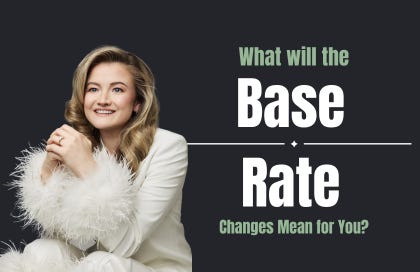Today, the Bank of England (BOE) lowered its base interest rate from 5% to 4.75%. If you're curious about how this change impacts your finances and day-to-day expenses, you’re in the right place. Let’s break down the main areas that could affect you, complete with examples and tips to help you take advantage of this rate change.
What Is the Base Rate?
The base rate is the interest rate the Bank of England charges other banks for borrowing money. This rate affects everyday financial products such as loans, mortgages, and savings accounts. When the base rate changes, it often leads to shifts in the borrowing and saving rates offered by banks and lenders, affecting your monthly payments and overall savings.
Mortgages and Loans
Lower Interest, Lower Payments?
If you have a mortgage or a loan with a variable or tracker rate, a drop in the base rate could result in lower monthly repayments. Here’s how this might work:
Example
Suppose you have a tracker mortgage of £150,000 with an interest rate of 5%. With the base rate dropping by 0.25%, your interest rate would likely decrease to around 4.75%. This change could save you approximately £30 to £40 each month—savings that could be used for other essentials or added to your savings.
While fixed-rate mortgages won’t see immediate changes, the lower base rate may lead to more attractive rates in future fixed-rate offers.
Savings Accounts
A Slight Decrease in Growth
While lower borrowing costs are beneficial for those repaying loans, savers may see a slight reduction in the growth of their accounts. Banks typically adjust interest rates on savings accounts when the base rate changes, meaning your savings might not increase as much as they would with a higher base rate.
Example
If you have £10,000 in a savings account earning 2.5% interest, and the bank reduces this to 2.25%, you would earn £25 less in interest over a year. While this decrease is relatively small, it is something to consider if maximising savings growth is your goal.
Credit Cards and Personal Loans
Credit cards and personal loans often come with variable interest rates, so a decrease in the base rate might eventually make borrowing more affordable. However, the changes aren't always immediate and depend on your lender. If you’re planning to take out a personal loan or transfer a balance, now might be a good time to compare offers, as some lenders may introduce lower interest rates in response to the BOE’s decision.
Example
If you have a personal loan of £10,000 with an interest rate of 8%, a reduction to 7.75% could save you about £25 annually. While that might not seem significant, every little bit counts!
Everyday Purchases and Inflation
Lowering the base rate is part of the BOE’s efforts to stabilise the economy, especially in times of high inflation. While this rate cut alone won’t provide immediate relief from rising costs, it’s part of a broader strategy to alleviate inflationary pressures. You may notice minor effects on costs like utilities or transportation, but such changes can take time to materialise.
Tips for Making the Most of the Rate Change
If you have Savings
Consider shopping around for the best interest rates, as some banks and building societies may offer competitive rates. An Individual Savings Account (ISA) or a fixed-term savings account could help you lock in a rate for the coming year.
If you’re Looking to Borrow
With the base rate now lower, it could be a good opportunity to review any variable loans or consider refinancing for better rates. Always compare offers and carefully check the terms.
If you’re Managing Debt
Use any savings from reduced loan or mortgage payments to pay off high-interest debts. Even a small reduction in debt each month can accumulate and lower your overall interest payments.
By understanding the implications of the base rate drop and making informed decisions, you can better manage your finances in this changing landscape.
Thank you for reading this article. If you've found this valuable please share and subscribe.






A few things to note post the press conference:
1. The monetary policy voted 8-1 with 8 choosing to drop the rate by 0.25% and 1 wanting to keep it at 5%.
2. Rachel Reeves the chancellor stated "welcome news for millions of homeowners and businesses".
3. Whilst wer have another rate decision happening in December this may be the last drop of 2024.
I will keep adding here but what do you feel about this drop??